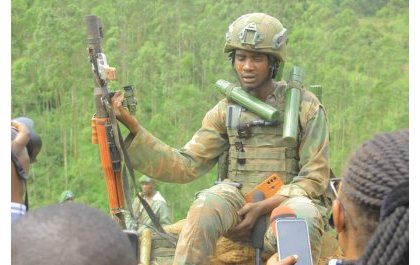The Rwanda Defense Forces (RDF) have dismissed circulating social media reports claiming that one of its soldiers was captured in the Democratic Republic of Congo (DRC). The reports have been spreading through platforms dominated by DRC citizens and Rwandans opposed to the Rwandan government.
These allegations gained traction after the Armed Forces of the Democratic Republic of Congo (FARDC) presented a man to the media, claiming he was a Rwandan soldier captured during combat between Mombasa and Ndoluma. According to FARDC’s spokesperson for Sokola 1 operations in North Kivu, the individual is said to be a member of an elite RDF unit and was allegedly detained on December 21, 2024.
In a video shared by FARDC, the man identified himself as Hakizimana Iradukunda Jean de Dieu. He claimed to have been born in Ngororero District, Western Province, Rwanda, and said he joined the RDF through Gabiro military base. He further alleged that he was deployed to the DRC over a year ago and claimed that four RDF divisions had been sent to the DRC.
RDF, through its official X (formerly Twitter) account, categorically denied the claims, labeling them as “baseless rumors.” The denial was supported by RDC journalist Justin Kabumba, who described the allegations as unsubstantiated.
Since the resurgence of M23 rebel activity in Eastern DRC, the Congolese government has frequently accused Rwanda of supporting the group. However, Rwanda has consistently denied these accusations, asserting that the allegations lack evidence and serve as a scapegoat for DRC’s failure to address internal issues, including the grievances of Congolese citizens advocating for their rights.
Moreover, Rwanda has accused FARDC of collaborating with the FDLR, a militia composed of individuals responsible for the 1994 Genocide against the Tutsi in Rwanda. This ongoing blame game has further strained relations between the two nations, complicating efforts for regional peace and stability.
RDF’s firm denial of the latest claims underscores Rwanda’s stance against what it describes as deliberate attempts to tarnish its reputation internationally. It also highlights the intricate and volatile dynamics in the Great Lakes region, where cross-border conflicts, rebel activities, and geopolitical tensions persist.
As the situation develops, observers call for credible investigations and regional dialogue to address these recurring allegations and foster a path toward long-term peace.




